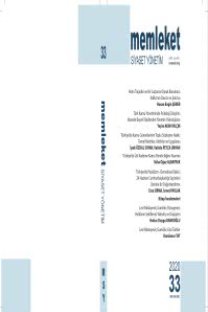AVRUPA BİRLİĞİ ÜYELİK SÜRECİNDE ESKİ SOVYET ÜLKELERİNDE GERÇEKLEŞTİRİLEN İDARİ REFORMLARIN NEDENLERİ VE SONUÇLARI
Türkiye’de 2000’li yıllarda gerçekleştirilen idari reformların Avrupa Birliği’ne uyum amacıyla yapıldığı belirtilerek, son genişlemede yer alan eski Sovyet ülkelerinde de benzer idari reformların gerçekleştirildiği ileri sürülmektedir. İdari kapasite kavramı, Merkezi ve Doğu Doğu Avrupa ülkeleri olarak da adlandırılan bu ülkelerin Birliğe adaylık sürecinde işlerlik kazanmıştır. Birliğin bu ülkelerden ne tür reformları, hangi nedenlerle talep ettiğinin ve bu reformların sonuçlarının belirlenmesi Türkiye’deki idari reform tartışmaları açısından önemlidir. Makale, eski Sovyet ülkelerine yönelik olarak Birliğin tutarlı ve standart idari kriterler geliştiremediğini, weberyen çerçevede yapılan idari reformların yeni kamu işletmeciliği çerçevesinde yapılan reformlara göre daha başarılı olduğunu ileri sürmektedir.
Anahtar Kelimeler:
İdari Reform, Avrupa Birliği, Genişleme, İdari Kapasite, Kamu Yönetimi.
Keywords:
İdari Reform, Avrupa Birliği, Genişleme, İdari Kapasite, Kamu Yönetimi.,
___
- Akdoğan, A. A., Türk Kamu Yönetimi ve Avrupa Birliği: Karşılaştırmalı Eleştirel Bir İnceleme, TODAİE: Ankara, 2008.
- Brusis, M., “The Instrumental Use of European Union Conditionality: Regionalization in the Czech Republic and Slovakia”, East European Politics and Socities, (19) 2, 2005, s. 291-316.
- Cardona, F. P., The European Administrative Space: Assessing Approximation of Administrative Principles and Practices among EU Member States, SIGMA, OECD: Paris, 2002, http:// www.sigmaweb.org/dataoecd/33/46/35678337.pdf (15.12.2007).
- Dimitrova, A. L., “Governance by Enlargement? The case of the administrative capacity requirement in the EU’s Eastern enlargement”, Canterbury’deki Kent Üniversitesi’nde 6-8 Eylül 2001’de düzenlenen Konferansta sunulan bildirinin ikinci versiyonu, 2001, http://www.essex.ac.uk/ECPR/events/jointsessions/paperarchive/turin/ws4/dimitrova.pdf (15.12.2007).
- Drechsler, W., “Public Administration in Central and Eastern Europe: Considerations from the ‘State Science’ Approach’”, içinde Burlamaqui, L., Castro, A.C. ve H.-J. Chang (ed.), Institutions and the Role of the State, Edward Elgar, Cheltenham/Northampton, 2000.
- Dünya Bankası, “EU-8 Administrative Capacity in the New Member States: The Limits of Innovation”, 36930-GLB Numaralı Rapor, 2006, siteresources.worldbank.org/ INTSLOVAKIA/Resources/ EU8AdminCapacity.doc (15.12.2007).
- Engelbrekt, K., “Multiple Asymmetries: The European Union’s Neo-Byzantine Approach to Eastern Enlargement”, International Politics, (39) 1, 2002, s. 37-51.
- Fournier, J., “Administrative Reform in the Commission Opinions Concerning the Accession of the Central and Eastern European Countries”, içinde SIGMA (ed.) Preparing Public Administrations for the European Administrative Space, SIGMA Papers No. 23, CCNM/ SIGMA/PUMA (98) 39, 1998.
- Goldschmidt, P., Dorulova, M., Niculescu, T. ve A. Stemberger, Reference Guide for Horizontal Integration, The Network of Institutes and Schools of Public Administration in Central and Eastern Europe: Bratislava, 2005.
- Grabbe, H., “How Does Europeanization Affect CEE Governance? Conditionality, Diffusion and Diversity”, Journal of European Public Policy, (8) 6, Aralık, 2001, s. 1013-1031.
- Héritier, A., “The Accommodation of Diversity in European Policy Making and Its Outcomes: Regulatory Policy as a Patchwork”, Journal of European Public Policy, (3) 2, 1996, s. 149- 167.
- Jora, S., “International Organizations and Democratization Models: The Case of EU Accession of Romania”, CDAMS Discussion Paper, 06/10E, Center for Legal Dynamics of Advanced Market Studies, Kobe University: Japonya, 2006, ww.cdams.kobe-u.ac.jp/archive/dp06-10. pdf (15.12.2007).
- Kochenov, D., “The Failures of Conditionality EU Enlargement Law: A Plea for Reform of the Democracy Promotion Component”, Paper presented at the Jean Monnet Conference on Europe’s Democratic Challenges – EU Solutions, Università degli studi di Trento, 30 Haziran - 1 Temmuz, 2006.
- Kodakcı, D. ve E. Yıldırım, AB Müktesebatının Uygulanması İçin Gerekli “İdari Kapasite” ve Türkiye’nin Durumu, T.C. Başbakanlık Avrupa Birliği Genel Sekreterliği Ulusal Program Dairesi, Ankara, 2002.
- Lippert B., Umbach, G. ve W. Wolfgang, “Europeanisation of CEE Executives: EU Membership as a Shaping Power”, Journal of European Public Policy, (8) 6, 2001, s. 980-1012.
- Meyer, S. ve J. Hinrik, “Civil Service Reform in Post-Communist Europe: The Bumpy Road to Depoliticisation”, West European Politics, (27) 1, 2004, s. 71-103.
- O’Dwyer, C., “Reforming Regional Governance in East Central Europe: Europeanization or Domestic Politics as Usual?”, East European Politics and Societies, (20) 2, 2006, s. 219-253.
- Oliveira Rocha, J. A., “Administrative Reform in Portugal: Problems and Prospects”, International Institute of Administrative Sciences, (73) 4, 2007, 583-596.
- Preston, C., Enlargement and Integration in the European Union, London and New York: Routledge, 1997.
- Pridham, G., “EU Accession and Domestic Politics: Policy Consensus and Interactive Dynamics in Central and Eastern Europe”, içinde Ross, C. (ed.), Perspectives on Enlargement of the European Union, Brill, Leiden, 2002.
- SIGMA, European Principles for Public Administration, SIGMA Papers No. 27, CCNM/ SIGMA/PUMA (99) 44/REV 1, SIGMA: Paris, 1999.
- Randma-Liiv, T. ve B. Connaughton, “Public Administration as a Field of Study: Divergence or Convergence in the Light of ‘Europeanization’?”, TRAMES, (9) 4, 2005, s. 348-360.
- Scherpereel, J. A., “Europeanisation, Democratisation, and Institutional Reform in Central and Eastern Europe: The Case of Civil Service Reform”, Paper Presented at the conferen- ce Europeanisation and Democratisation: The Southern European Experience and the Perspective for New Member States of the Enlarged Europe, Instituto Italiano Scienze Umane, Florence, 16-18 Haziran, 2005, http://www.cires-recerca.it/conferences/conferences. php (15.12.2007).
- Spanou, C., “European Integration in Administrative Terms: A Framework for Analysis and the Greek Case”, Journal of European Public Policy, 5 (3), 1998, s. 467-484.
- Stark, D. ve L. Bruszt, Postsocialist Pathways: Transforming Politics and Property in East Central Europe, Cambridge University Pres: Cambridge, 1998.
- Verheijen, A. J. G., “Administrative Capacity Development: A Race Against Time?”, WRR Working Document, 107, Scientifi c Council for Government Policy: Lahey, 2000, http://www. wrr.nl/english/content.jsp?objectid=2892 (15.12.2007).
- Völkel, C., “Le ‘Grand Elargissement’ et le Respect du Droit Communautaire”, Notre Europe, 2004, www.pedz.uni-mannheim.de/daten/edz-k/gde/04/etudeCvolkel.pdf (15.12.2007).
- Wessels, W., “Administrative Interaction”, içinde Wallace, W. (ed.), The Dynamics of European Integration, Pinter: London, 1990, s. 229-241.
- ISSN: 1306-8202
- Yayın Aralığı: Yılda 2 Sayı
- Başlangıç: 2006
- Yayıncı: Yerel Yönetim Araştırma Yardım ve Eğitim Derneği (YAYED)
Sayıdaki Diğer Makaleler
TÜRKİYEDE 1980 SONRASI KADIN HAREKETİNİN SİYASAL TEMELLERİ ve “İKİNCİ DALGA” UĞRAĞI
“ONURLU GİRİŞ”TEN AKDENİZ ORTAKLIĞI”NA Bir Avrupa Birliği Öyküsü
ANKET YÖNTEMİYLE LİDERLİK YÖNELİMLERİNİ TESPİT MODELLEMESİ (AYLİYÖNTEM)
AVRUPA BİRLİĞİ NEO-LİBERALİZM VE İDARİ REFORM İLİŞKİSİ
TÜRKİYEDE SİYASİ PARTİ KAPATMA VE AVRUPA ÖRNEKLERİ Parti Kapatmak Demokrasi Tehdidi mi?
1950Lİ YILLARDA KAMU YÖNETİMİ DİSİPLİNİ Disiplinin Kuruluşu Nasıl Gerçekleştirilmişti?
